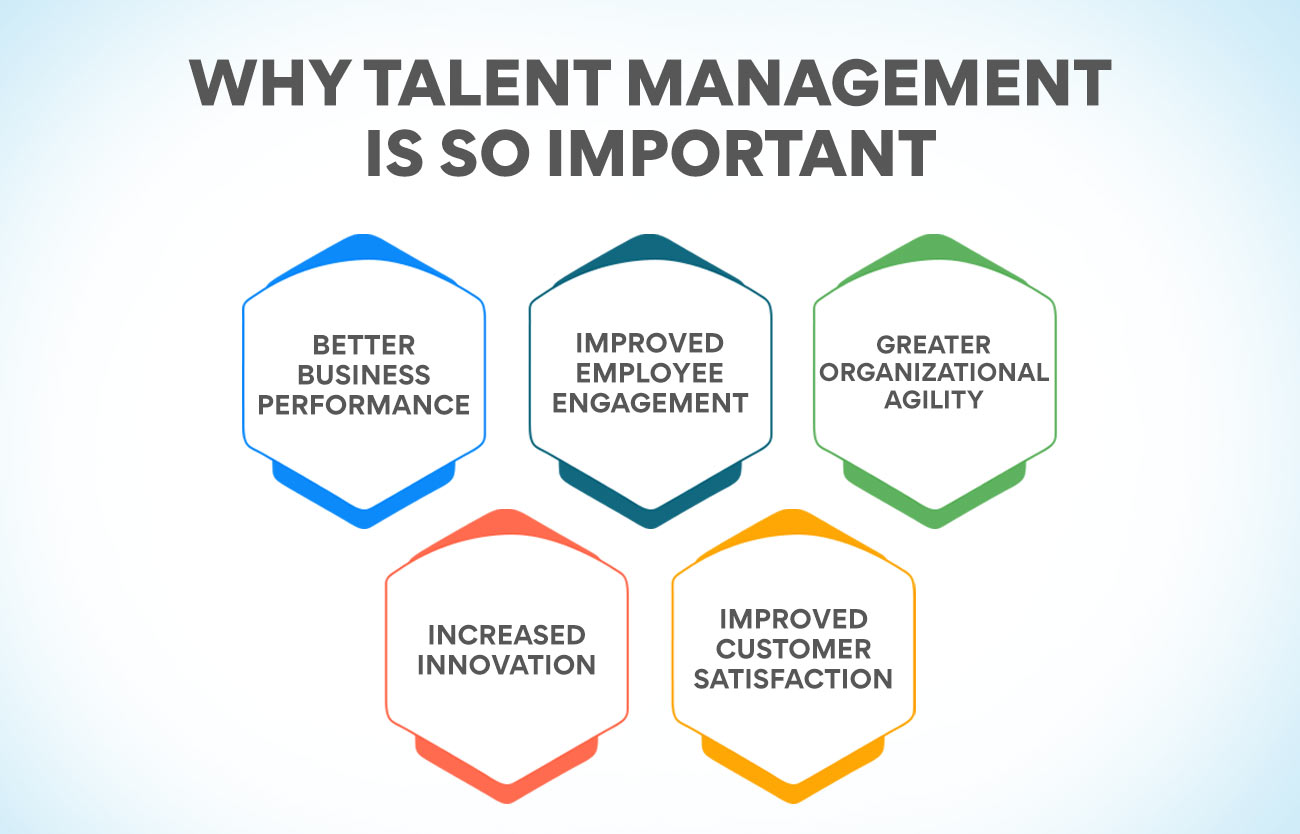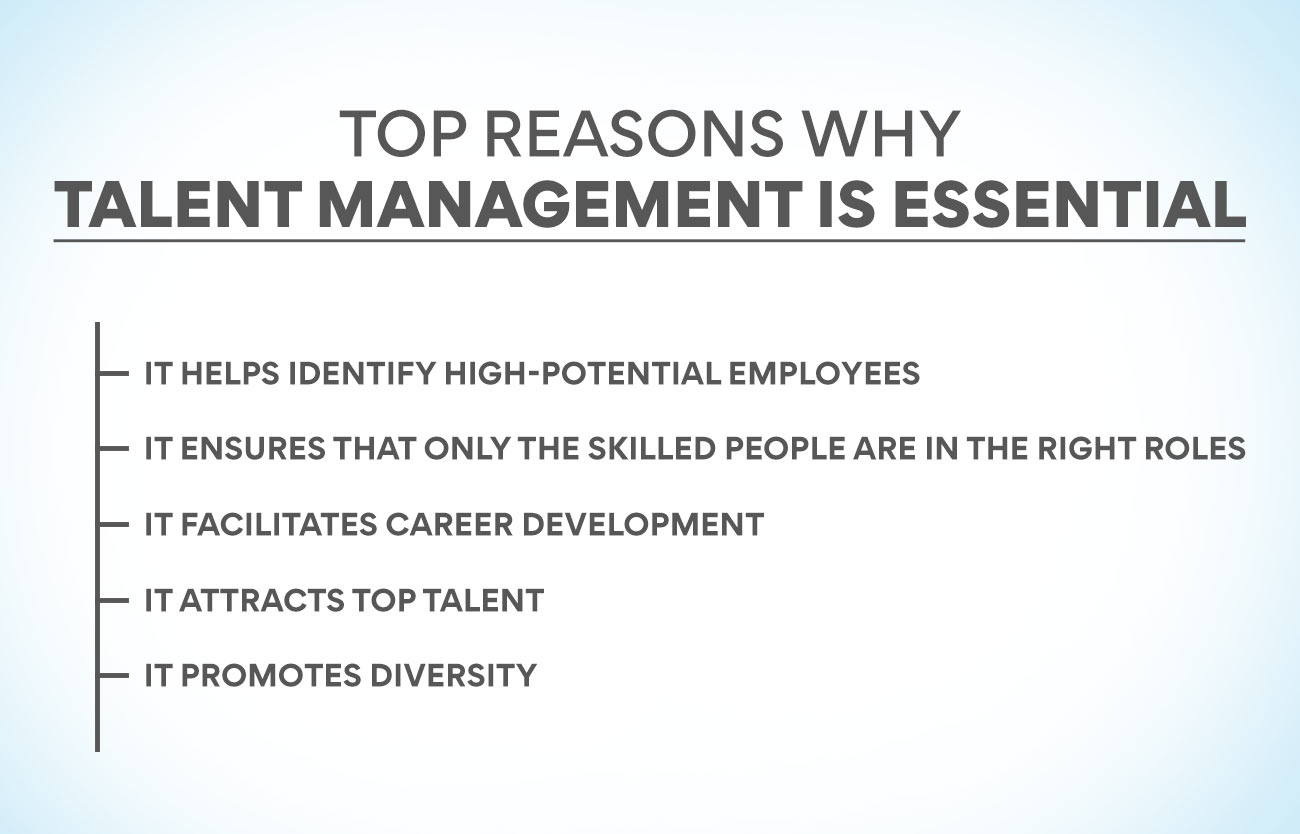People are the most valuable asset of any organization. Talent management has become progressively popular over the last few years as organizations strive to attract, assess, develop and retain the best people. There are many different definitions of talent management, but at its core, talent management is about attracting, nurturing, and developing employees who have the potential to make a real difference in an organization’s success. This blog post will explore some top reasons why talent management (TM) is essential for businesses. From attracting top talent to developing a robust internal pipeline, read on to learn more about why talent management should be a priority for your organization.
Helps In Recruiting The Best Talents
In a world where the war for talent is more intense than ever, companies need to find ways to attract and retain the best employees. One way to do this is through talent management.
Talent management is identifying, developing, and retaining employees with high-potential performers. It includes succession planning, performance management, and employee development.
There are many benefits of talent management. Most importantly, it helps companies recruit and retain the best employees. With a good talent management system, companies can identify star performers and keep them on board. This can lead to a competitive advantage in the marketplace.
Other benefits of TM include improved employee productivity, better succession planning, and increased engagement. When employees feel they are being managed effectively, they become more productive and engaged in their work. It can lead to better business outcomes for the company.
Also Read: Strategic Workforce Planning: Steps and Process
Enhances Productivity To Meet Goals
Talent management is essential for many reasons, but enhancing Productivity to meet goals is one of the most important.
There are a few critical ways that talent management can help to enhance Productivity and help an organization meet its goals. First, by identifying top performers and then creating development plans specifically for them, organizations can ensure that their best employees are given opportunities to grow and improve their skills. It not only benefits the employees themselves but also helps to drive the organization forward.
Second, talent management can help to identify potential areas of improvement for the organization as a whole. By conducting regular performance reviews and looking at data on employee engagement, retention, and succession planning, organizations can pinpoint areas where they need to make changes to be more productive.
Third, talent management can create a more positive work environment overall. When employees feel valued and have opportunities to grow within the organization, they are more likely to be involved and productive with the work. This type of positive work environment can ripple effect throughout the entire organization, leading to better results.
Ultimately, talent management is essential because it enhances Productivity and helps organizations reach their goals. By identifying top performers, looking for areas of improvement, and creating a positive work environment, talent management can help any organization achieve success.
Reduces The Cost Of Frequent Hiring
It is no secret that hiring new employees can be expensive. The process of advertising, interviewing, and onboarding new hires can take a toll on a company’s budget. However, with TM in place, organizations can reduce the cost of frequent hiring.
Talent management involves identifying, developing, and retaining top talent. By investing in talent management, companies can create a pool of qualified candidates that they can draw from when vacancies arise. This saves the time, resources, and money that would otherwise be spent on recruiting new employees.
In addition to reducing the cost of hiring, talent management can also improve employee retention rates. Employees who feel like they have a clear career path and opportunities for development are more likely to continue with a company for a longer period. It reduces turnover costs and helps organizations save money in the long run.
Brings Innovation To The Work Culture
Innovation is the key to success in any industry. And talent management is vital in promoting innovation within an organization. Here are the top reasons why talent management is essential:
- It helps identify high-potential employees: Talent management helps identify employees with the potential to be future leaders of the organization. This is done through various assessment tools and techniques such as psychometric testing, 360-degree feedback, etc.
- It ensures that only the skilled people are in the right roles: By aligning employee roles with their skills and abilities, talent management helps ensure everyone is working to their strengths. This leads to increased productivity and overall performance of the organization.
- It facilitates career development: Talent management programs help employees progress in their careers by providing them with access to training and development opportunities. This helps employees stay motivated and engaged, which leads to better retention rates.
- It attracts top talent: A robust talent management program can help an organization attract top talent from outside its walls. It is because potential candidates see that the organization is serious about developing its people and promoting from within.
- It promotes diversity: By fostering diversity and inclusion, talent management programs help create a more positive work environment for all employees. This leads to increased creativity and innovation as different perspectives are brought to bear on solving problems.
Boosts Employee Morale
Talent management is essential not only for attracting and retaining top talent but also for boosting employee morale. A company that actively involves and invests in its employees and helps them reach their full potential is a company that employees are proud to work for. When employees feel valued and supported, they are more likely to be engaged and productive. Additionally, happy employees are more likely to spread positive word-of-mouth about their company, which can help attract even more top talent.
Retains The Best Talents
One of the primary benefits of TM is that it helps organizations retain their best employees. Good talent management programs identify high-potential employees and provide them with opportunities to grow and develop within the company. This helps to keep top talent from leaving for other organizations. Additionally, talent management can help improve employee engagement and satisfaction, leading to improved retention rates.
Improves The Business Performance
Talent management is critical to the success of any organization. By investing in the right talent and providing them with the adequate resources they need to succeed, organizations can see a significant return on their investment. Check out the top reasons why Talent Management is so important:
- Better Business Performance – Organizations that invest in talent management see better business performance. It is because they can attract and retain top talent, which leads to increased productivity and improved results.
- Improved Employee Engagement – Talent management also leads to improved employee engagement. When employees are appreciated and valued, they are more likely to be committed to the work.
- Greater Organizational Agility – Talent management helps organizations be more agile by allowing them to adapt quickly to changes in the marketplace. Organizations can respond quickly to new opportunities or challenges by having a pool of talented employees.
- Increased Innovation – When organizations invest in talent management, they tend to see an increase in innovation. It happens as they can attract creative employees who can take risks and try new things.
- Improved Customer Satisfaction – Talent management also improves customer satisfaction. Businesses focusing on talent management can better meet customer needs and exceed expectations.
Increases The Client Satisfaction
Client satisfaction is one of the ultimate goals of any business. After all, if the people you’re selling to or providing a service for aren’t happy, they will not likely stick around for long. That’s where TM comes in. By making sure you have skilled people in the appropriate positions doing the right things, you can ensure that your clients are always happy with what you’re giving them. Check out a few of the ways that talent management can help increase client satisfaction:
- The Right People in The Right Positions: One of the biggest complaints that clients have is that they feel like they’re talking to someone who doesn’t know what they’re doing. When you hire the right people, you can be sure that your clients are always talking to someone who knows exactly what they need and how to give it to them.
- Doing Things Right: Another big complaint clients have felt like their time is wasted. If you’ve got talented people working for you, they’ll ensure that everything is done right the first time so that your clients don’t feel like their time is wasted.
- Being proactive: Nobody likes it when things go wrong, but it happens to everyone at some point. What separates good businesses from great ones is how they handle problems when they crop up. By proactively addressing problems before they become more significant, you can show your clients that you care.
What Are The Best Practices For Talent Management?
Several best practices for talent management can help organizations ensure that they are attracting, developing, and retaining the best employees. Some of these best practices include:
- Clearly defining what talent the organization needs and aligning talent strategies with business goals.
- Creating a positive employer brand that attracts top talent.
- Focusing on employee development and engagement to retain top performers.
- Building a comprehensive succession planning process to ensure continuity of leadership and expertise.
- Implementing robust performance management systems to identify and develop high-potential employees.
What Are The Futuristic Developments We Can Witness In Talent Development?
To ensure that organizations have a continuous supply of high-quality talent, talent development must be a key focus. We can expect to see several futuristic developments in this area in the coming years.
One such development is using big data and analytics to identify potential talent. By analyzing large data sets, organizations can identify patterns and trends that can help them identify individuals with the potential to be high-performing employees.
Another key development will be using technology to create more personalized and immersive learning experiences. With advances in virtual reality and other technologies, it will become increasingly possible to create training programs that provide a realistic and engaging learner experience.
Finally, we can expect a continued focus on global talent development. We expect to see more initiatives to identify and develop global talent pools. As organizations become increasingly international in scope, they will need to ensure they have access to top talent from around the world.
Also Read: What is Stakeholder Engagement? Importance, Planning and Implementation
5 Key Components of Talent Management
To ensure that an organization has high-quality talent, it is essential to have a robust talent management system in place. The key components of an effective talent management system include the following:
- A clear understanding of the organization’s business strategy and the specific skills and competencies required to support it.
- Identify and assess the organization’s current and future talent needs.
- A plan for attracting, developing, and retaining talent that meets the identified needs.
- Implementation processes and tools that support the execution of the TM plan.
- Regular monitoring and evaluation of the effectiveness of the talent management system against organizational goals and objectives.
How To Become A Talent Manager?
There is no definite path to becoming a talent manager, but there are some commonalities among successful managers. Many talent managers have experience working in the entertainment industry in other capacities, such as agents, publicists, or artist development executives.
In addition to industry experience, successful talent managers are often well-connected individuals who have built up an extensive network of contacts over the years. They use these connections to help their clients land gigs and secure high-profile projects. This gives them the necessary contacts and knowledge of the business to succeed in their role as talent managers.
Talent managers must also be good at multitasking and handling multiple clients at once. They need to be organized and efficient to keep track of their client’s schedules, meet deadlines, and ensure that everything runs smoothly.
Last but not least, successful talent managers must have excellent people skills. They must work well with others and build strong relationships with their clients and industry professionals.
Conclusion
Companies that manage their talent strategically perform better than those that don’t. This is because they can identify and invest in developing high-potential employees and create a positive work environment attracting and retaining the best talents. In the current competitive business landscape, companies need to be proactive about talent management to stay ahead of the curve.
Check out our Post Graduate Certificate in Human Resource Management which is ideal for both freshers and professionals.
More Information:
Better employee relation can lead to a rapid business expansion: Know 11 Tips
What Is Compensation In HRM? Everything You Need To Know




























